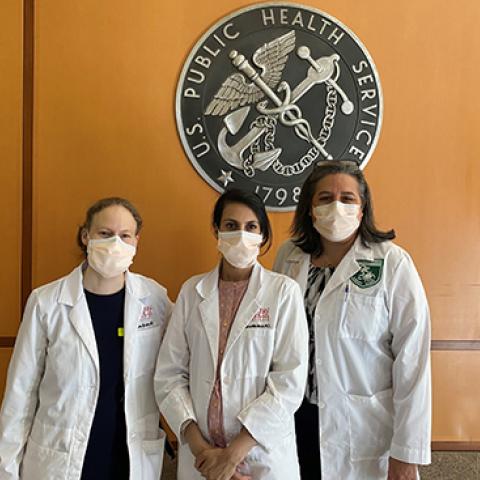
From left to right: Jennifer N. Brudno, Lekha Mikkilineni and Stephanie L Goff.
Photo credit: Neil Parikh
Immunotherapy is a type of treatment that helps the immune system fight cancer. CCR researchers have pioneered many of the seminal advances in immunotherapy and are conducting clinical trials aimed at creating immune-based cancer treatments. The Surgery Branch was responsible for the development of interleukin-2 (IL-2), the first effective immunotherapy in humans, the development of T-cell transfer immunotherapies for melanoma and other solid cancers, and the first successful use of chimeric antigen receptor (CAR) cell therapy in patients with lymphoma. In honor of Immunotherapy Awareness Month, and the physicians driving this groundbreaking research, we asked Lekha Mikkilineni, M.D., Stephanie L. Goff, M.D., and Jennifer N. Brudno, M.D., members of the Surgery Branch, about their work with immunotherapy.
What is the most rewarding aspect of your work with immunotherapy?
Lekha Mikkilineni (LM): Giving patients the opportunity to try a new therapy that can lead to long-lasting remissions is what drives me. When I see patients achieve remarkable responses to our immunotherapies and see what a noticeable improvement to their quality of life these therapies bring, that is the biggest reward.
Stephanie L. Goff (SLG): The most rewarding aspect of my work will always be my patients. It is within them that cutting-edge science transforms into hope and because of them that we get closer to the medicines of tomorrow.
Jennifer N. Brudno (JNB): It is very rewarding to see patients have a great response to a new cellular therapy, especially when other therapies have not worked for them in the past.
Where do you see immunotherapy headed? What are the challenges ahead?
LM: I focus on chimeric antigen receptor or CAR T-cell therapy for treating multiple myeloma. A big challenge is understanding why patients relapse after receiving this breakthrough therapy. Eventually, we hope that CAR T-cell therapy can be curative, but to do so we must gain a deeper understanding of how myeloma clones can continue to grow after therapy.
SLG: We’ve learned how powerful the immune system can be when eliminating cancer, and I think the future of immunotherapy will be learning how to fine-tune the application of that power – whether that’s through better patient selection (biomarkers of response) or more specific target selection (cell engineering).
JNB: The big challenges for adoptive immunotherapy, I believe, are developing more effective cellular therapies for more malignancy types and improving toxicities and toxicity management of cellular therapies. A lot of great work is being done in both areas. I think where we are heading is toward safer cellular immunotherapies that can be given in an outpatient setting and at smaller centers, as well as cellular therapies being standard of care for a wider variety of malignancies.
About the experts: Lekha Mikkilineni is an Assistant Research Physician whose research focuses on bringing novel multiple myeloma CAR T-cell therapies to patients through phase I clinical trials at the NIH Clinical Center. Stephanie L. Goff is an Associate Research Physician whose research is focused on the use of adoptive cell transfer in patients with metastatic breast cancer and patients with melanoma. She shares responsibility for the care and management of patients receiving cell-based immunotherapy for the treatment of metastatic solid tumors on protocols established by the Surgery Branch. Jennifer N. Brudno, Associate Research Physician, researches the use of CAR T-cell therapy to treat cancers of the blood, including non-Hodgkin lymphoma, Hodgkin lymphoma, acute lymphoblastic leukemia and multiple myeloma.